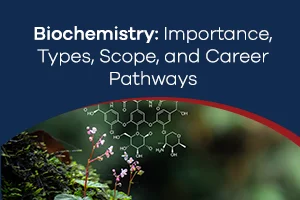Biochemistry: Importance, Types, Scope, and Career Pathways

Biochemistry refers to the study of biological functions at the molecular and cellular levels using chemistry. It originated as a discrete science at the start of the twentieth century. The scientists coupled chemistry, physiology, and biology to study the chemistry of living systems.
Importance of Biochemistry
The following points necessitate a thorough knowledge of biochemistry.
- The chemical processes convert diet into substances particular to the cells of a given species.
- Enzymes‘ catalytic activities.
- Using the potential energy generated by the oxidation of the food consumed for the numerous energy-consuming processes in the living cell.
- The features and structure of the chemicals that make up the framework of both cells and tissues.
- To find solutions to major biological and medical challenges.
What are The Different Types of Biochemistry?
This section below describes the primary branches of biochemistry.
1. Molecular Biology
It is also known as the foundation of this field. It involves the study of how living systems work. The connections and production of DNA, proteins, and RNA are all described by this branch of biology.
2. Cell Biology
Cell biology studies the composition and purposes of cells in living things. Another name for it is cytology. In contrast to microbiology, which addresses subjects related to prokaryotes, cell biology largely focuses on the study of cells of eukaryotic species and their signalling pathways.
3. Metabolism
One of the most crucial processes that all living organisms go through is metabolism. All that occurs when food is transformed into energy in a human body is a series of actions or transformations. The digestion process is one manifestation of metabolism.
4. Genetics
The study of genes, gene variants, and the traits passed down through inheritance in living things is the focus of the biochemical field of genetics.
The other branches are:
- Environmental Biochemistry
- Photosynthesis
- Toxicology
- Endocrinology
- Biotechnology
- Molecular chemistry
- Genetic engineering
- Plant and Animal biochemistry
- Pharmaceuticals
- Neurochemistry
- Endocrinology
Scope of Biochemistry in Pakistan
Biochemistry has a wide range of applications in Pakistan. The public and business sectors both recruit biochemists. In Pakistan, the demand for biochemistry has risen significantly over time and will continue to do so. Thus, biochemistry is a rewarding career in Pakistan.
Graduates with a BS Biochemistry will be qualified to work in a variety of industries, including:
- Pharmaceutical Industry
- Educational Institutions
- Hospitals
- Food Industry
- Agriculture Research
- Forensic Science
and many more.
What Careers You Can Pursue with a BS Biochemistry Degree?
After earning a degree in this field, you can opt for a wide range of rewarding careers. People with biochemistry degrees generally work in the following fields:
1. Biochemist
A biochemist examines and tests the composition and functioning of various life forms in order to determine how specific chemical processes affect them. Other important duties and responsibilities you will have as a biochemist are:
- Developing and carrying out scientific studies,
- Analyzing and documenting enormous data sets and findings
- Offering suggestions on chemical processes based on their results
- Modifying chemical compounds for usage by the general public or by medical specialists.
2. Biochemistry Professor
A professor in this field teaches students about various aspects of biochemistry while working in any academic organization. Your primary responsibilities include:
- Giving lectures, conducting exams, quizzes, and assignments,
- Staying at the institute during office hours to answer any queries that students have related to the lectures
- Supervising lab experiments that students do
- Developing and managing the syllabi that relate to and meet the program’s necessary curriculum.
3. Forensic Scientist
To assist law enforcement in prosecuting defendants in criminal matters, forensic scientists examine different types of evidence. Other duties that you will perform are:
- Evaluating blood spatter patterns at crime scenes
- Tracking drugs and other banned drugs in tissues and bodily fluids
- Controlling and conserving crime scenes until appropriate personnel arrives
- Performing post-mortem investigations on crime victims.
4. Medical Scientist
A medical scientist studies human diseases and disorders to find methods that can improve people’s health. Along with these responsibilities, the job also involves:
- Building and testing a variety of medical devices
- Conducting studies to look into human diseases and potential treatments
- Analyzing medical data and samples to identify the causes and risks of specific chronic diseases or harmful bacteria
- Writing proposals for financial assistance from both government and private sources.
5. Research Scientist
A research scientist performs experiments on various scientific ideas to confirm or disprove particular scientific hypotheses or findings. Your job as a research scientist will also include:
- Devising fresh ideas for scientific research
- Leading efforts to gather data
- Publishing significant findings in scientific and educational journals.
Other careers include:
- Agricultural scientist
- Biochemical engineer
- Biological or biomedical engineer
- Chemical engineer
- Cosmetics developer
- Federal regulator of biochemical products
- Fermentation scientist
- Food researcher and developer
- Laboratory technician
- Laboratory scientist
- Microbiologist
BS Biochemistry at UCP
The University of Central Punjab offers different undergraduate and graduate courses in the field of biochemistry. The curriculum is designed according to HEC guidelines and sets you on the path to professional success.
For more information, contact us at info@ucp.edu.pk.
